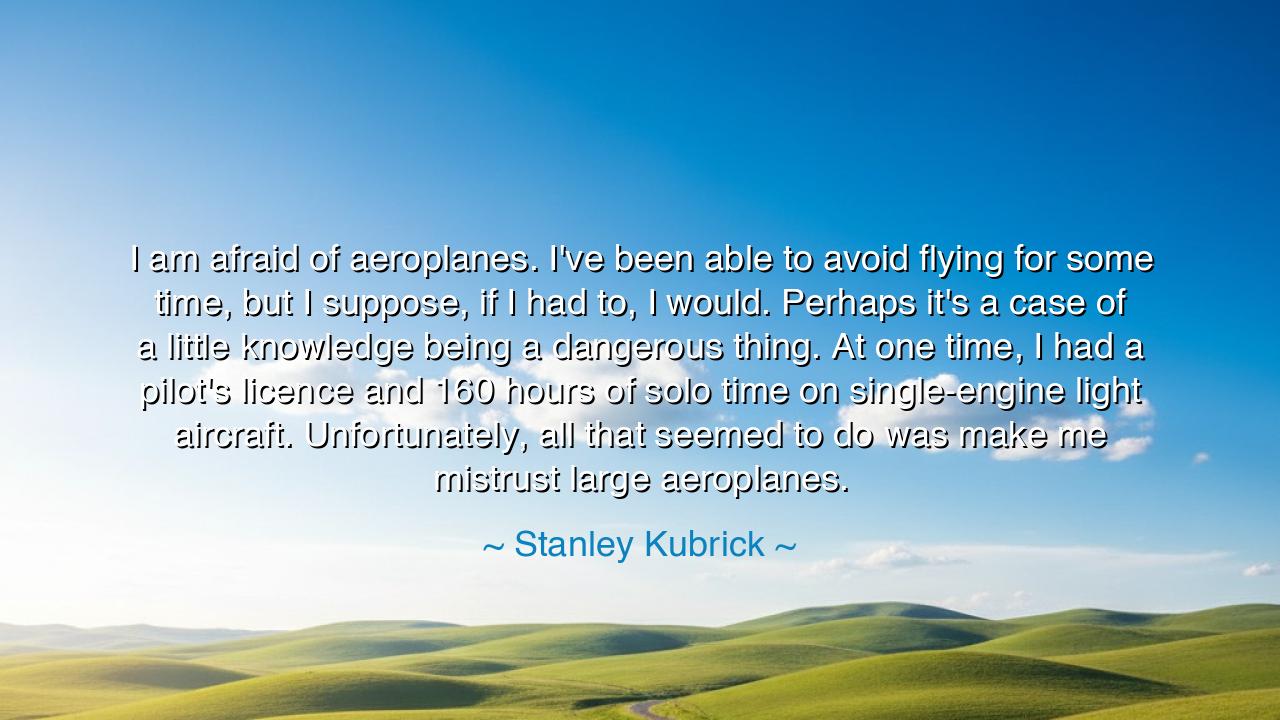
I am afraid of aeroplanes. I've been able to avoid flying for
I am afraid of aeroplanes. I've been able to avoid flying for some time, but I suppose, if I had to, I would. Perhaps it's a case of a little knowledge being a dangerous thing. At one time, I had a pilot's licence and 160 hours of solo time on single-engine light aircraft. Unfortunately, all that seemed to do was make me mistrust large aeroplanes.






Hear now the curious confession of Stanley Kubrick, master of cinema and seeker of perfection, who spoke: “I am afraid of aeroplanes. I've been able to avoid flying for some time, but I suppose, if I had to, I would. Perhaps it's a case of a little knowledge being a dangerous thing. At one time, I had a pilot's licence and 160 hours of solo time on single-engine light aircraft. Unfortunately, all that seemed to do was make me mistrust large aeroplanes.” In these words lies both irony and truth: the man who commanded great visions on screen, who dared to imagine space voyages and futures beyond imagination, was himself captive to fear when faced with the machines of flight.
This quote reveals the paradox of knowledge. For Kubrick had learned the secrets of the air—he had trained his hands to guide light aircraft, had felt the trembling of wings against the wind, had stared down the vastness of the sky with courage. Yet rather than granting him peace, this knowledge deepened his suspicion of larger planes. What for most is a symbol of safety and advancement became, in his eyes, an object of mistrust. This is the meaning of the old warning: “a little knowledge is a dangerous thing.” When one knows only enough to see the risks, but not enough to see the hidden safeguards, fear can grow stronger than reason.
Such a lesson has been lived by many throughout history. Consider the tale of the early inventors who feared electricity. They knew enough to see its deadly spark, to witness its dangers when uncontained, but they did not yet know how it could be safely harnessed. For years, suspicion and mistrust slowed progress, until deeper knowledge revealed electricity as the very power that would light the world. Here again, partial knowledge bred fear, while fuller understanding brought mastery and peace.
Kubrick, ever the perfectionist, understood the frailty of machines and the margins of error. He saw the world through the lens of detail, knowing how the smallest flaw could bring catastrophe. In his films, every movement was crafted, every frame considered, and so it was with his view of the skies. Where others surrendered themselves to trust, Kubrick wrestled with the awareness of what could fail. His knowledge gave him mastery over small planes, but not faith in larger ones. Thus, wisdom without balance became a chain rather than a key.
Yet within his confession lies also a gift to us. Kubrick shows that fear is not weakness but a mirror: it reveals how we understand the world, how we weigh danger, how we reckon with trust. To admit fear is to acknowledge that human beings are not only creatures of logic but also of frailty. And it is precisely in the space between fear and courage that progress is made. For though he feared planes, Kubrick never ceased to soar in vision, creating images of space travel and human daring that continue to inspire generations.
The lesson, then, is this: do not stop at half-knowledge. If you find yourself fearing what you partly understand, press further into wisdom. Study deeply, learn more, so that fear may be replaced with trust. At the same time, do not despise fear, for it is a teacher—it reveals what we value, what we dread, and where we must grow. Like Kubrick, you may find that a little knowledge unsettles you, but greater knowledge, joined with humility, can set you free.
So I say to you: seek not only to know, but to understand fully. Do not let fragments of learning enslave your heart to suspicion, but pursue the whole picture with patience and courage. And when fear comes, as it surely will, let it guide you not into retreat, but into deeper inquiry and steadier faith. For though the skies may tremble, and though the machines of men may fail, the spirit that seeks truth without stopping will always find wings strong enough to rise.
Thus shall Kubrick’s confession live as more than a private fear—it becomes a parable for all. A little knowledge can bind us, but true knowledge, joined with courage, can set us free.






AAdministratorAdministrator
Welcome, honored guests. Please leave a comment, we will respond soon